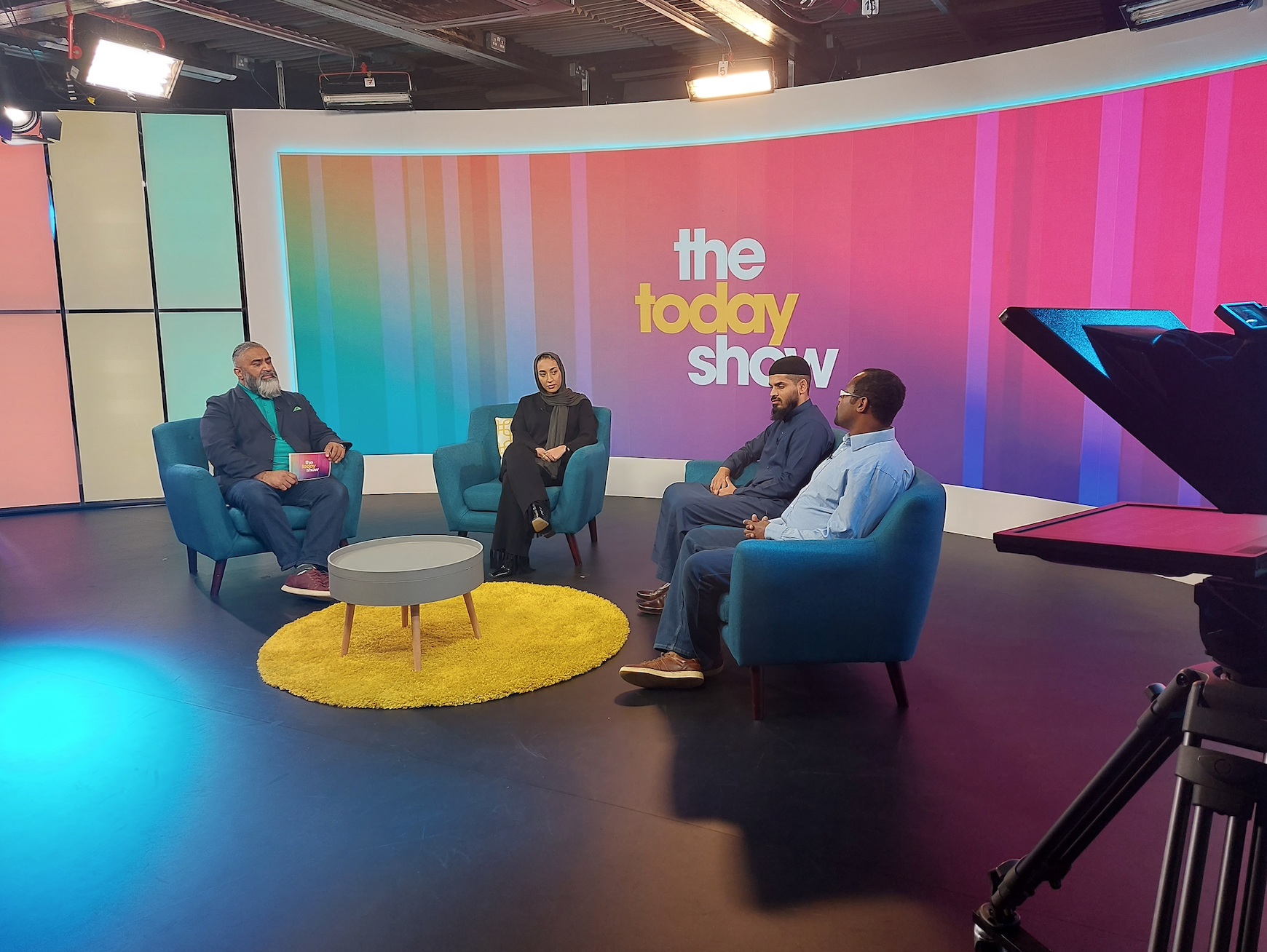In a recent episode of Islam Channel’s new daily chat show The Today Show, host Na’eem Raza spoke to staff and students from The Open University.
Syed Bilal Ahmed, a student at The Open University, said that he had no idea about distance learning until he was told about it at work. He described how he had amused his colleagues when he told them: “I had never heard about The Open University and I was like, okay, so where is the university?”. In fact The Open University is ‘everywhere’ – with learning delivered wherever you are, by expert tutors.
He was eager to get back into studying and signed up for a course after the conversation with a colleague. “When I first went on to the [Open University] website, there were so many things I could go into. But the reason why I chose Health and Social Care was because it’s relevant to my job,” said Syed. Syed’s employer, an Islamic boarding school, is highly supportive of him studying at university, and he is confident his studies will allow him to progress in his career.
Mariah Idrissi is a former Open University student, who is perhaps best known as the UK’s foremost hijab-wearing model. She described how she graduated from the OU, having studied a degree in English Literature and History.
She had previously attended a different university, but found that her travel and work commitments meant that she had to find another way to continue studying. “I didn’t calculate how many hours it would take to get to the university, and how many days a week I had to be there. So then my friend, who joined The Open University, told me about it,” said Mariah. Mariah was able to transfer some of the credits she had earned from her previous study, and put them towards her Open University qualification.
Thanks to distance learning, she was able to continue working and complete her degree.
Supported distance learning for over 50 years
The Open University has changed how it delivers its courses. During the 70, 80s and 90s, the main medium was TV and radio. But the internet and new media have opened up more possibilities.
“Things have changed a lot,” said Dr Yoseph Araya, a Tutor at The Open University. “But the ideals of the university haven’t changed. It is open to methods, ideas, and people.”
Having undertaken distance learning for over 50 years, the university is well versed in ensuring its materials are accessible and inclusive to all students and needs. “So there will be videos, which will have transcripts associated with them. There will be tutorial forums where you can talk, and recordings will be made available for people not able to access it. There are a variety of methods to ensure that the topic is taken into the level of detail needed,” Dr Yoseph said.
Flexible learning
A third of the students at the OU are under 25, and an increasing number are choosing to study at full time intensity, which Mariah did. But regardless of the demographic, distance learning allows students to manage work, family and study life better.
For Mariah, the pull was knowing that she could manage her own time and work around other activities. “If my family is going on holiday, I’ll just take my laptop with me and I’ll work from abroad. So things that you just couldn’t do conventionally, worked for me,” she said.
Dr Yoseph added: “It offers a different and alternative approach to studying where you can be flexible. It enables people to work and earn, or [deal with] other commitments like travel or family commitments. And it provides good quality education.”
How distance learning works
But what about courses like sciences, where you would think being physically at university might be an advantage. How does the OU deal with that?
“We do have a variety of courses. And students, in some courses use their surrounding environment as a living laboratory,” said Dr Yoseph.
“We have remote laboratories as well where students can manipulate and do experiments, controlling machines in our laboratories on campus. And in some cases, like in astronomy, they control telescopes to look at the skies in other countries as well,” he added.
In the past, interacting with tutors and fellow students remotely could have been seen as a negative, but in this post-pandemic world, it’s very much the norm.
Syed said it’s a “major misconception” that with distance learning you get less contact with tutors and fellow students than at a traditional university.
“With The Open University, it’s all online,” he said. “We have exactly the same thing. You have contact with your tutor and speak to them, especially when it comes to exam seasons.
“We also have WhatsApp groups, student forum groups, tutorials that take place where you can meet other students and study together. You can even meet up in real life.”
With Covid, interest in distance learning has grown. And The Open University was well placed to deal with the demand, having already made high quality distance learning accessible to over two million students since it was established in 1969.
“You know, we didn’t predict COVID happening. And The Open University was already established to cater for people that needed to study online anyway,” said Mariah.
If you missed this episode of The Today Show, you can catch up here.
Applications are now open for The Open University’s next cohort. If you’re interested in applying or want to learn more, visit the website.


















